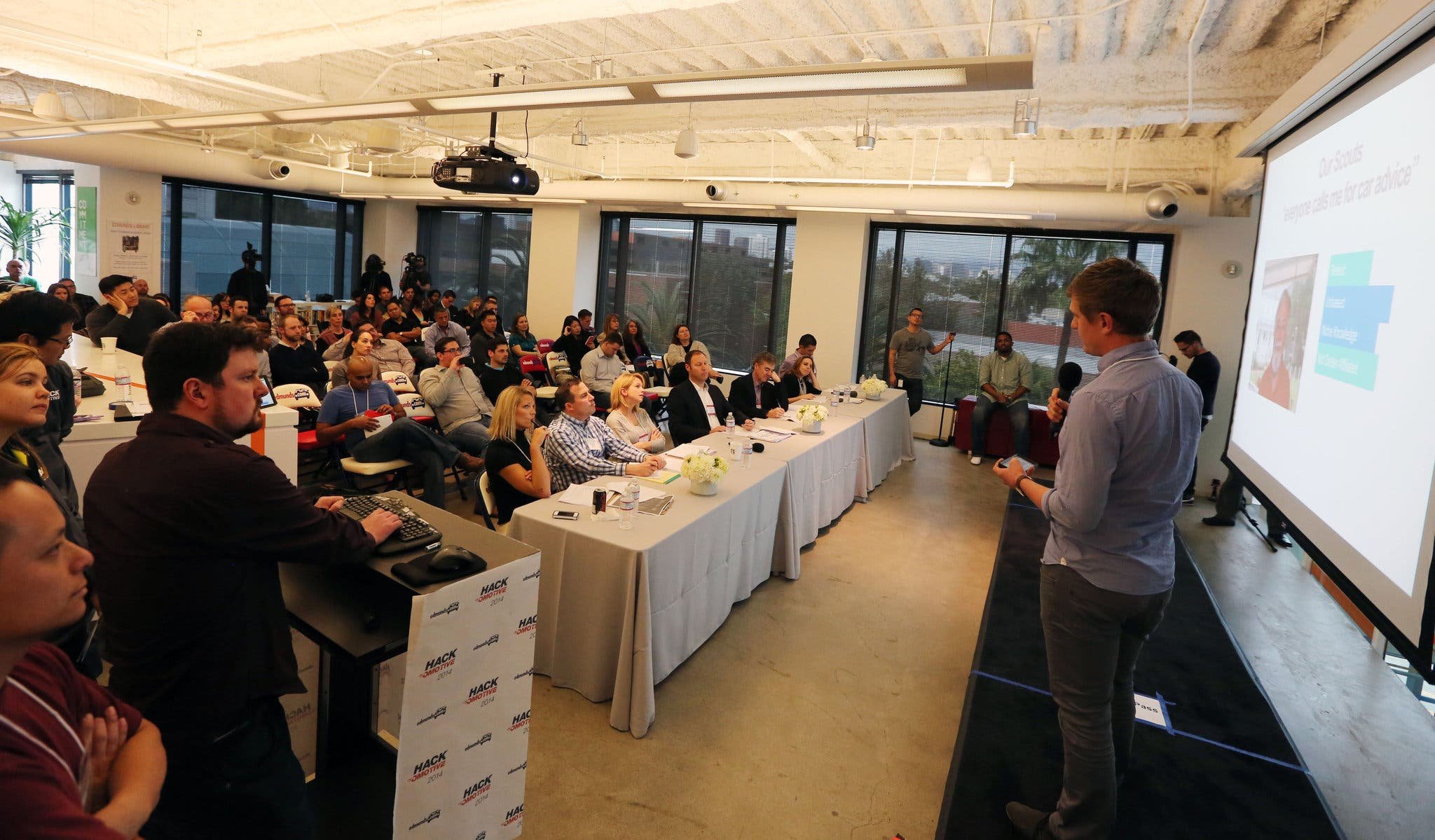Dreams of a More Streamlined Car-Buying Process, With Technology as Facilitator
Original source: The New York Times
SANTA MONICA, Calif. — For generations, the auto dealer has been the primary avenue for carmakers to sell vehicles to consumers.
But technology is rapidly changing that equation. Consumers no longer depend on dealers to learn about cars, and automakers are trying to sell more directly to consumers — despite the varying restrictions in most states on manufacturers’ owning or operating dealerships.
And the pace of that change is only accelerating. Last month, a dozen teams, including several car dealers, honed and presented their ideas for better ways to sell cars at a three-day competition called Hackomotive and sponsored by Edmunds.com, a car-buying site that provides industry research.
“We’re seeing this massive shift in how people shop, looking for answers in real time,” said Nick Gorton, co-founder of the Seattle-based Carcode.me, which won the contest’s $20,000 grand prize at the event, held here at the Edmunds headquarters. “The rise of the smartphone is particularly disruptive.”
The company won for a new service called Carcode SMS that allows car shoppers to communicate by text message with dealers through an app that dealerships can use to respond to inquiries.
Mr. Gorton, who has worked at car dealerships, including his family’s two Chrysler dealerships in Michigan, was one of several car sellers-turned-entrepreneurs at the event.
An appetite exists for overhauling the traditional model, event organizers said, with 68 teams applying to compete. More than half the competitors traveled to Santa Monica from cities including New York, Atlanta and Houston. Changing the buying model “is so overdue,” said Holly Dudley, head of enterprise portfolio and project management at Prosum Technology Services, who was a judge at the competition.
Several projects stretched the boundaries of the online sales process, allowing buyers and sellers to connect more easily and even scheduling test drives without the seller needing to be present. That business, called Carvoyant, lets shoppers subscribe to a monthly service and, after a background check, receive a lockbox code to obtain keys to any car they would like to drive. A device connected to the car’s data port lets its owner monitor the location and speed remotely.
“There are elements of the process that are ripe for disruption,” said Avi Steinlauf, chief executive at Edmunds. These include the availability of information on a vehicle’s price and history, the way test drives are scheduled, and the automation of financing and registration, he said.
Developers made presentations at Hackomotive, a three-day competition looking for ideas about better ways to sell cars.Credit...J. Emilio Flores for The New York Times
Edmunds plans to help or team with some of the teams to develop their ideas after the competition, Mr. Steinlauf said.
Tim Kelly, a third-generation car dealer from Chattanooga, Tenn., presented with his partner, Joe Alegre, a website called Carclips.com intended to alleviate some of the challenges he faces selling cars at his own dealership. Carclips adds urgency to the shopping process, Mr. Kelly said, by combining eBay’s auction style with PayPal’s reliability in verifying the vehicle title and funds.
“It addresses the lack of urgency in the business, where someone on the lot goes, ‘I’ll think about it,’ and the dealer either has to push or let it go,” he said.
But instead of creating a listing online, sellers would put a sticker in the car window. Potential buyers could scan the sticker using their smartphone for more information.
Developers from Au.to, which took home the second-place prize of $10,000, described their business as “Google for cars.” Au.to’s developers have built a search engine and database that allows users to search for vehicles with keywords like “domestic truck,” “midlife crisis,” or “soccer mom.”
It is unclear whether any of the projects would encounter legal obstacles in disrupting the traditional dealer network.
Tesla, for example, has been battling dealer associations in at least six states for the right to bypass dealer networks and sell directly to consumers from its stores. Last month, after a protest at the Capitol, legislators in Washington State amended a bill that would prevent Tesla from opening more stores, by excluding manufacturers who already have a license to do so.
The approach varies by state, said Charles Cyrill, a spokesman for the National Automotive Dealers Association. He said that 48 states had varying restrictions on manufacturers owning or operating dealerships.
“It is, of course, up to the legislature of each state to make the determination of what regulations to adopt for its local marketplace,” he wrote in an email. “It is easy to see the rationale for state laws that foster a well-capitalized, independent dealer network.”
But the message at the competition was clear: Visiting a dealership, browsing cars and then choosing one “is a story of the past,” said Hans-Werner Kaas, a senior partner in McKinsey’s automotive and assembly practice.

